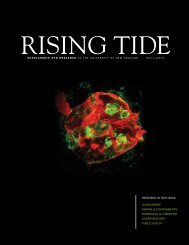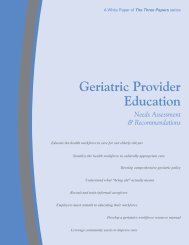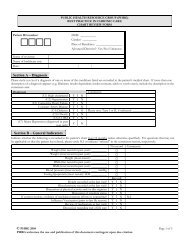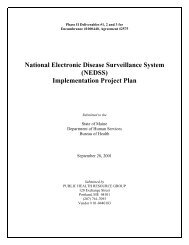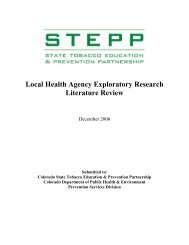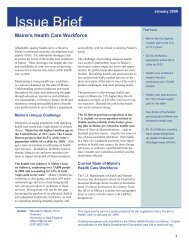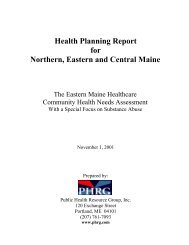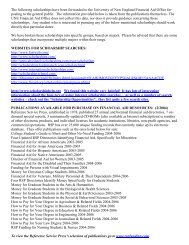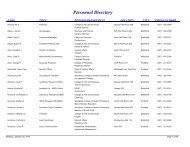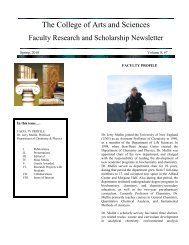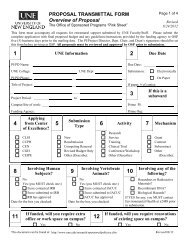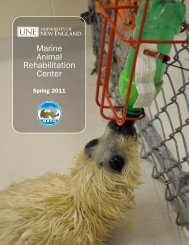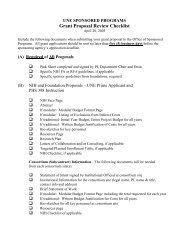Acute Flaccid Paralysis Accompanying West Nile Meningitis Ahmed ...
Acute Flaccid Paralysis Accompanying West Nile Meningitis Ahmed ...
Acute Flaccid Paralysis Accompanying West Nile Meningitis Ahmed ...
You also want an ePaper? Increase the reach of your titles
YUMPU automatically turns print PDFs into web optimized ePapers that Google loves.
A New Diagnosis of Adult Onset Still’s Disease<br />
Graef, E, OMS III; Cormier, D, DO, DPT; Verma, P, MD; McCormack, E., MD.<br />
Roger Williams Medical Center, Internal Medicine, Providence, RI.<br />
Introduction: Adult Onset Still’s Disease (AOSD) is a systemic inflammatory disease of<br />
unknown etiology with an estimated prevalence rate less than 1/100,000. The<br />
characteristic symptom triad includes daily spiking fevers, evanescent erythematous<br />
rash, and arthritis. Diagnosis may be delayed as it requires exclusion of infections,<br />
neoplasms, and other autoimmune disorders.<br />
Case: A 58 year old Caucasian woman with a history of polymyalgia rheumatica on<br />
tapering prednisone, hypothyroidism, and type 2 diabetes mellitus was admitted after 16<br />
hours of fever, vomiting, and non-bloody diarrhea. On admission, review of systems was<br />
positive only for 4 days of left arm pain without recent trauma. Examination revealed vital<br />
signs within normal limits and decreased range of motion in the left upper extremity<br />
secondary to pain. Laboratory studies were significant for WBC 17,100/uL with 9%<br />
bands, hemoglobin 9.2g/dL, platelets 718,000/uL, ESR 128 mm/hour, C-reactive protein<br />
19.908 mg/L. Peripheral smear showed toxic granulation and Dohle bodies. Records<br />
reviewed from three outside hospitalizations within the previous 6 months revealed<br />
similar musculoskeletal complaints, hematologic abnormalities, and elevated<br />
inflammatory markers including ferritin levels between 575- 72,000. A recent outpatient<br />
ferritin was 27,008 ng/mL.<br />
While hospitalized, the patient developed recurring overnight fevers ranging from<br />
101-103.5 degrees F. Rheumatology, infectious disease, hematology/oncology, and<br />
gastroenterology were consulted. On hospital day 4, a transient erythematous<br />
maculopapular rash was noted on her shoulders and back. The rash recurred daily with<br />
intermittent pruritus and variable distribution over her back, shoulders, neck, and face.<br />
Negative workup included shoulder and elbow imaging, shoulder aspirations, blood and<br />
urine cultures, EGD, colonoscopy, HIDA scan, and abdominal ultrasound. CT<br />
chest/abdomen/pelvis showed diffuse lymphadenopathy. Serology was negative for HIV,<br />
tick borne illnesses, ANA, RF, or CCP. Thyroid screen was unremarkable. Iron studies<br />
showed serum iron 38 mcg/dL, transferrin 123 mcg/dL, ferritin >1650 ng/mL, and soluble<br />
transferrin receptor 2.6 mg/L. PPD was negative. By hospital day 8, the negative<br />
infectious workup in combination with her persistent symptomatology and elevated<br />
ferritin were deemed sufficient to proceed with an AOSD diagnosis. Prednisone was<br />
increased to 45 mg daily and after remaining afebrile for 24 hours, she was discharged.<br />
She continues to improve in rheumatology follow up.<br />
Discussion: This case demonstrates the extensive clinical evaluations that may be<br />
obtained before arriving at a diagnosis of AOSD given the broad and potentially<br />
devastating differential. Diagnosis can be complicated by the disease’s rarity, variable<br />
presentation, and lack of a specific diagnostic test. This patient had multiple recent<br />
hospitalizations and interim outpatient monitoring involving symptoms and signs strongly<br />
suggestive of AOSD. Markedly elevated serum ferritin levels are a notorious, yet nonspecific,<br />
feature of AOSD. This case emphasizes the importance of considering AOSD<br />
when a patient has a ferritin level greater than 5 x ULN.



